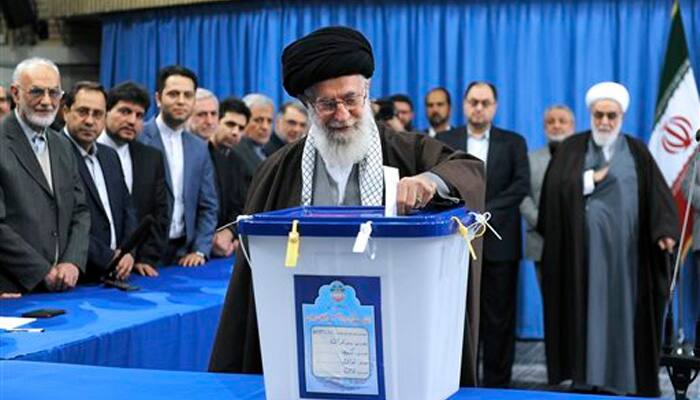Tehran: Iranians voted in elections on Friday likely to determine the pace of their emergence from years of economic isolation, with Iran`s top leader, a stern critic of detente with the West, urging a big turnout to snub the country`s "enemies".
There were early signs of enthusiastic participation in Iran`s first polls since a nuclear deal last year led to a lifting of sanctions and deeper diplomatic engagement abroad.
Long queues formed at polling stations in the capital and state television showed throngs of voters in Ahvaz and Shiraz. It was unclear how the turnout might shape the outcome.
The vote could determine whether the Islamic Republic continues to emerge from effective diplomatic and economic quarantine after years of sanctions.
"Whoever likes Iran and its dignity, greatness and glory should vote. Iran has enemies. They are eyeing us greedily," Supreme Leader Ayatollah Ali Khamenei said after casting his vote, in a reference to Western powers.
"Turnout in the elections should be so high to disappoint our enemies ... People should be observant and vote with open eyes and should vote wisely."
At stake is control of the 290-seat parliament and the 88-member Assembly of Experts, the body that has the power to appoint and dismiss the supreme leader, Iran`s most powerful figure. Both are currently in the hands of hardliners.
During its next eight-year term it could name the successor to Khamenei, who is 76 and has been in power since 1989.
Supporters of President Hassan Rouhani, who championed the nuclear deal and is likely to seek a second presidential term next year, are pitted against conservatives deeply opposed to detente with Western powers.
“This is my religious duty to vote as Imam Khamenei said. My vote is a slap in the face of Islam’s enemies,” said 23-year old Hassan Ali Mehri in the holy Shi’ite city of Qom, saying the West "wants to harm our country and Islam".
“I will vote because I like Rouhani and his policies. We should be patient and help him by voting for moderate candidates,” said housewife Mina Sabri, 56, in the northwestern city of Orumiyeh.
Rouhani said the government would spare no effort to protect people’s votes and to ensure healthy and legitimate elections, the official IRNA news agency reported him as saying.
The opposition website Kaleme said without elaborating that turnout was higher than in previous elections.
Interior Minister Abdolreza Rahmani Fazli said no security issues had been reported, state news agency IRNA reported.
Influential former president Ayatollah Akbar Hashemi Rafsanjani, allied to Rouhani, told Reuters that Iran would lose if reformists were defeated in Friday`s contests.
Asked what would happen if reformists did not win, he said: "It will be a major loss for the Iranian nation."
Results hard to predict
Foreign Minister Mohammad Javad Zarif, who led nuclear talks with world powers, told Reuters while voting at the Jamaran mosque in northern Tehran that Iranians would continue to support policies that brought about the nuclear deal.
"The message to the international community from this election is the Iranians are solidly behind their government," he said. "They will continue to support the policies that have been adopted leading to the conclusion and successful implementation of the nuclear deal and this will continue."
"Whatever the choice of the Iranian people, it will be respected," he said.
Hassan Khomeini, a politically moderate cleric and grandson of revolutionary founder Ayatollah Ruhollah Khomeini, received a warm welcome from hundreds of cheering onlookers when he arrived to vote at Jamaran, witnesses said. A similar reception greeted reformist former president Mohammad Khatami.
Most reformist candidates have been barred by a hardline clerical vetting body, along with many moderates, but their supporters have called on voters to back Rouhani`s allies and keep the conservatives out.
Results are hard to predict, with conservatives traditionally doing well in rural areas and young urbanites favouring more reformist candidates.
Setting course
If the Assembly of Experts is called upon to choose a successor to Khamenei, its decision could set the Islamic Republic`s course for years or even decades to come.
Mistrust of the West runs deep, and hardliners have sought to undermine Rouhani`s allies by accusing them of links to Western powers.
A more supportive parliament would allow Rouhani to continue his economic reforms at home and diplomatic engagement abroad.
Whatever the outcome, though, Iran`s political system places significant power in the conservative establishment including the Guardian Council, the judiciary and the Supreme Leader.
The 12-member Guardian Council must approve all new laws and vet all electoral candidates. It has already played a role in Friday`s vote by excluding thousands of candidates, including many moderates and almost all reformists.
Nevertheless, prominent reformists and moderates have scrabbled together a joint list of candidates in Tehran - 30 for parliament, and 16 for the Assembly of Experts - and hope this can propel them to an overall majority in both bodies.
















